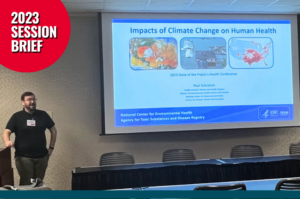By Woody Lofton
 While many people are aware that climate change can cause a decrease in air quality that leads to health problems like respiratory and cardiovascular diseases, less attention has been directed at its impact on mental health.
While many people are aware that climate change can cause a decrease in air quality that leads to health problems like respiratory and cardiovascular diseases, less attention has been directed at its impact on mental health.
At the 12th annual State of the Public’s Health conference, two experts shed light on the climate-driven health challenges that impact public health agencies and communities. Paul Schramm, health scientist for the CDC, kicked off the session outlining various global challenges posed by climate change.
“Challenges we face by climate change include extreme heat, air pollution, mental health issues, and inclement weather,” said Schramm.
According to the CDC, many of these challenges are linked to increased respiratory and cardiovascular diseases, reduced quality of air, and weather-related deaths.
And, research shows an alarming increase in mental illness linked to climate change, including increased levels of anxiety and post-traumatic stress disorder. Also, rates of suicide and depression increase with higher temperatures, and patients with conditions like dementia and schizophrenia are at risk for hospitalization because their medications may make them more sensitive to hotter temperatures.
Schramm noted the CDC is taking action to address these issues. The CDC’s Climate and Health Program is the national leader for encouraging communities to protect human health from the challenges posed by climate change. They provide funding, research and resources to aid U.S. health agencies on all levels. Climate and health resources are also accessible to the public from their website.
Athens-Clarke County sustainability officer Mike Wharton presented solutions for the local Athens community to address challenges posed by climate change.
“Problems we face in Athens are loss of biodiversity, weather extremes, wildfire threats and natural disasters,” Wharton said.
Wharton said the focus in Athens is on increasing clean and renewable energy resources and ecological resource management. A major contributor to climate issues is greenhouse gas emissions. Athens is limiting these emissions by increasing renewable resources through enhancing building efficiency, installing solar panels and improving the public transportation system with electric and hydrogen buses.
Wharton also noted the importance of the ecosystem, and its role in the health of the community.
“A community rises and falls based on its natural environment,” he said.
Athens is improving ecosystem health by planting trees, acquiring land and removing habitat invasive species. These contributions to the environment lead to reduced heat, higher air quality and improved physical and mental health.
He also encouraged the local community to contribute to climate-driven solutions by engaging in community planning activities, volunteering, or implementing small changes in their daily life.
“You can make a difference. It’s as easy as replacing light bulbs in your home with LED bulbs,” Wharton said.
